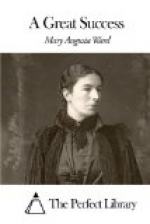“I suppose, Mrs. Meadows, you have been helping your husband with his lectures?” said Lady Dunstable, a little languidly, as though the heat oppressed her. She was making play with a cigarette and her half-shut eyes were fixed on the “lion’s” wife. The eyes fascinated Doris. Surely they were artificially blackened, above and below? And the lips—had art been delicately invoked, or was Nature alone responsible?
“I copy things for Arthur,” said Doris. “Unfortunately, I can’t type.”
At the sound of the young and musical voice, the gentleman with the Dundreary whiskers—Sir Luke Malford—who had seemed half asleep, turned sharply to look at the speaker. Doris too was in a white dress, of the simplest stuff and make; but it became her. So did the straw hat, with its wreath of wild roses, which she had trimmed herself that morning. There was not the slightest visible sign of tremor in the young woman; and Sir Luke’s inner mind applauded her.
“No fool!—and a lady,” he thought. “Let’s see what Rachel will make of her.”
“Then you don’t help him in the writing?” said Lady Dunstable, still with the same detached air. Doris laughed.
“I don’t know what Arthur would say if I proposed it. He never lets anybody go near him when he’s writing.”
“I see; like all geniuses, he’s dangerous on the loose.” Was Lady Dunstable’s smile just touched with sarcasm? “Well!—has the success of the lectures surprised you?”
Doris pondered.
“No,” she said at last, “not really. I always thought Arthur had it in him.”
“But you hardly expected such a run—such an excitement!”
“I don’t know,” said Doris, coolly. “I think I did—sometimes. The question is how long it will last.”
She looked, smiling, at her interrogator.
The gentleman with the whiskers stooped across the table.
“Oh, nothing lasts in this world. But that of course is what makes a good time so good.”
Doris turned towards him—demurring—for the sake of conversation. “I never could understand how Cinderella enjoyed the ball.”
“For thinking of the clock?” laughed Sir Luke. “No, no!—you can’t mean that. It’s the expectation of the clock that doubles the pleasure. Of course you agree, Rachel!”—he turned to her—“else why did you read me that very doleful poem yesterday, on this very theme?—that it’s only the certainty of death that makes life agreeable? By the way, George Eliot had said it before!”




